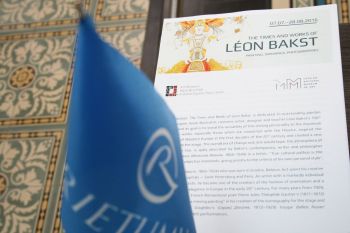The exhibition “The Times and Works of Leon Bakst” coincides with the 150th anniversary of the birth of this shining personality.

This exhibition is a central event in the cultural life of not only Latvia but the entire Baltics this summer. It represents paintings and graphic works of the artist, created at different periods, as well as his retained theatrical costumes, which even 100 years later impress with their elegance, colour and uniqueness. The exhibition has collected items from different collections. In particular, over 100 exhibits have been delivered to Riga from the richest collection of museums of theatre from Saint Petersburg and private and public collections of other countries, including the corporate collection of Belgazprombank in Minsk.
A native of Grodno, Leon Bakst (Rosenberg) became famous with his works for Diaghilev’s “Russian Seasons”, decorations and costumes for the legendary performances “Cleopatra”, “Sheherazade”, “The Blue God” and “The Sleeping Princess”, which have had enormous influence worldwide on scenic design concepts.
Since early childhood Bakst wanted to draw, but his parents did not take him seriously, and only when the boy’s drawings were seen by known artists, who recognized the talent in the boy, did his parents agree with the wishes of the child. Bakst studied for four years at the St. Petersburg Academy of Arts and later improved his skills in Paris.
Mutual relations of the painter with the theatre are a story of fantastic success in a genre where he did not even intend to work. His theatrical debut as a scene designer was in 1902, when the French pantomime “The Heart of Marquise” was staged at the Hermitage Theatre.
Artistic devices developed by Leon Bakst started a new epoch in stage design for ballet theatre. He devoted special attention to separate important fragments of a costume or accessories, remaining always a marvellous colourist. The painter was an outstanding scene designer and was actively working until his sudden death in 1924.
The bulk of his artistic works are now in Europe and the USA. But his early stage works, for example, sketches for “Hippolytus” by Euripides, “Oedipus at Colonus” by Sophocles and “The Fairy Doll” by Bayer, can be more often seen in Russian collections.
“The current exhibition is another project which is realized with the help of Rietumu Bank within the framework of our long-term cooperation with the Latvian National Museum of Art and the Art Museum Riga Bourse. Previous exhibitions supported by the bank, such as “Art of Faberge”, “Roerich and Latvia”, “Silver Age” and many others, have attracted strong interest not only in Latvia, but also in neighbouring countries. They have already become important events in the cultural cooperation between Latvia and the Baltics, the European Union and Russia. The support of the bank and the Rietumu Charity Fund has been manifested in the publication of art albums and catalogues. The bank assisted in the delivery of exhibits, organisation of exhibitions, etc. We are extremely satisfied by our cooperation and friendship with the Art Museum Riga Bourse – one of the best museums of art in the Baltic Sea region, which hosts many important events for the development of cultural and humanitarian relations between Latvia and its neighbours,” said Member of the Council of Rietumu Bank Alexander Gafin.
The exhibition will be open from 7 July to 28 August. Open hours of the museum can be found on its official webpage at http://www.lnmm.lv/ru/mmrb/.
The exhibition of Alexei Kuzmich "Madonna’s Temple” has been opened at the Rietumu Bank exhibition gallery, with the support of the Embassy of the Republic of Belarus and the Belarusian Information Centre.